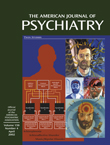To the Editor: We thank Dr. Kéri et al. for their kind comments regarding our article. While the issue of the effects of antipsychotic medication is important, it is unlikely to account for our finding of magnocellular dysfunction in schizophrenia. As cited by Dr. Kéri et al. (Masson et al., 1993), evidence suggests that dopamine may play a role in processing low-spatial, high-temporal frequency stimuli, which are thought to elicit predominantly magnocellular responses. However, the role of dopamine may be to decrease response under these spatiotemporal conditions
(1). Thus, blockade of dopamine receptors may in fact increase response under these conditions
(1). In addition, in previous visual backward-masking studies
(2,
3), we did not find a difference in performance in patients who were tested while they were and were not taking medication. This finding is in agreement with the results of other studies, showing that antipsychotic medications do not appear to cause this deficit (e.g., reference
4).
In the data set from our article, no significant correlations were found between chlorpromazine-equivalent doses and performance on any of the magnocellular- or parvocellular-biased conditions. Further, there were two patients who received no antipsychotic medication; their performance was either similar to, or more impaired than, that of the patients receiving antipsychotic medication.
Patients with schizophrenia who are more ill frequently receive higher doses of medication. Dr. Kéri et al. cited one of their own studies (Kéri et al., in press) that indicates that patients taking higher doses of medication exhibit greater magnocellular deficits. It is possible that this relationship may not be due to medication; rather, it might be associated with greater negative symptoms in these patients. We have now tested low- and high-functioning patients and found that, even though chlorpromazine-equivalent doses were similar in the two patient groups, low-, but not high-, functioning patients showed a magnocellular deficit in relation to comparison subjects.
We agree that patients with chronic, low-functioning schizophrenia have greater visual-processing deficits than other schizophrenia patients. Also, we agree that magnocellular function may be critically involved in higher perceptual/cognitive processes, such as spatial localization and attention. In our article, however, we suggested that because the patients showed a selective magnocellular deficit (since responses to parvocellular-biased stimuli remained intact), our findings are not the result of general inattentiveness to the task. In fact, we observed that fixation ability is typically excellent in patients. Attentional processes, however, were not investigated directly.

